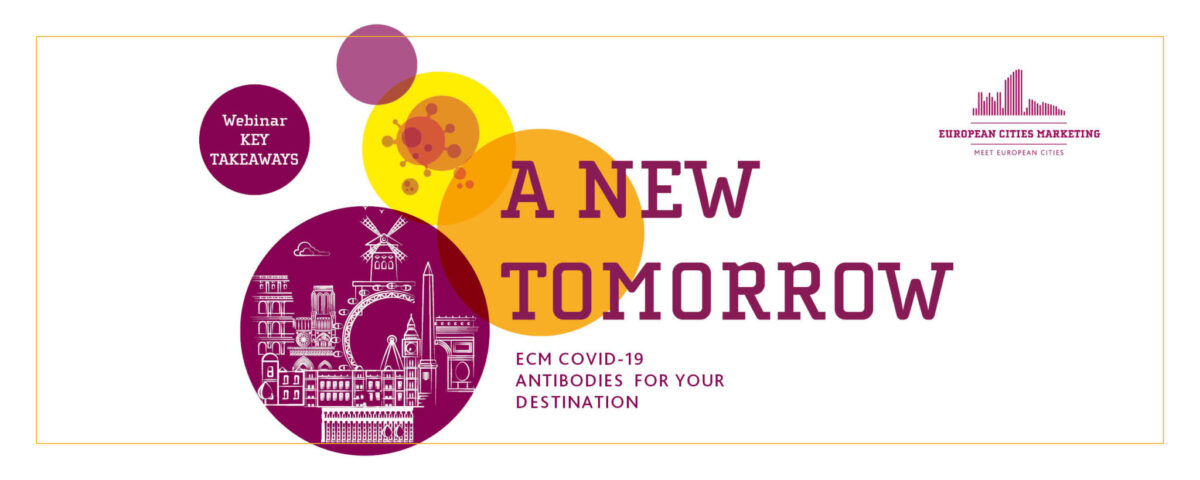Strategies for Sustainable Recovery

In a focused session, our ECM partners and members shared their views on how to rethink your DMO’s goals with sustainable finance and what their point of view is in terms of recovery, while keeping sustainability as a top priority.
Feel free to (re)watch the webinar recording below!
Guest speakers:
-
Sustainable Finance and the Redesign of Destination Management Goals
by Megan Epler Wood, Managing Director of Sustainable Tourism Asset Management Programme of Cornell University, Director of International Sustainable Tourism Initiative with Harvard University and Owner of EplerWood International
Building on the early report The Invisible Burden of Tourism, Megan Epler Wood recently published a white paper on how to finance a sustainable recovery for global destinations. Megan has then shared with us how to plan for a sustainable recovery, beyond the immediate urge to go back to business as usual.
Key takeaways:
- Pandemics accelerate existing trends and create a new type of capitalism which pushes us to higher levels of creativity and innovation, which in turn lead to regeneration.
- For a successful and sustainable recovery:
- one cannot only rely on market strategies because this will need more investment. To target these new investments and attract this new wave of finance, DMOs need to have a target instead of an objective and plan strategically for a new type of regenerative tourism (for more information, check out The Invisible Burden of Tourism).
- DMOs need to review their policy and how they share responsibility with their local authorities by managing their local asset. This implies making sure that the infrastructures are not over-burdened by measuring what is benefiting the destinations and what is not.
- To attract investments, new models should be considered: investment will have to be guided into vital infrastructures, including personnel, protect valuable resources, spread benefits to small and local businesses and ensure that this new development is climate-friendly.
- Potential objectives for sustainable finance could be improving your added value, protecting your assets, ensuring your infrastructures are climate-friendly and your locals are equally benefiting from this transition to a sustainable economy and create a transparent platform. If a destination implemented this system, then financing goals could also be set, like a review of the European-wide approach to raise standards for destination management or developing a clear policy framework for new sustainable finance mechanisms.
-
Strategic Outlook of DMOs in Recovery and Beyond – CEO panel
with Laura Aalto, CEO of Helsinki Marketing, Michael Otremba, CEO of Hamburg Tourism Board and Miguel Sanz, CEO of Madrid Destino
In this panel, our three speakers discussed the future of DMOs. Since the beginning of the crisis, they have been evolving in different contexts, different structures and frameworks so we asked each of them to share their experiences and thoughts on the future.
Key takeaways:
- Michael Otremba explained that in Hamburg, they are still in a phase of crisis management, trying to mitigate the damages as much as possible but they are also planning for recovery. They are supporting their partners who are fighting for their economical existence as much as they can. This crisis is bringing change and can redefine DMO’s roles so Michael is also rethinking his strategy, with sustainability as a top priority.
- In Madrid, Miguel Sanz also included sustainability in his recovery planning. He is currently helping small and medium businesses and partners to survive. To help small businesses, he has put into place webinars to help them with paperwork and explain the legal aspects of the situation. The goal is to help them survive, with the help of the locals, until visitors come back.
- Laura Aalto is currently working on three different tracks:
- first, she is focusing on being there for the travel industry through webinars, calls and an ongoing dialogue
- second, she saw in this crisis the opportunity to create something new in terms of communication about the destinations: virtual events and experiences
- finally, she is also working towards the future and trying to understand where the world is going.
- Laura Aalto thinks that the customers’ behavior will change and the way we travel will be different: travel will be more value-based, more aligned with the values travellers believe in. Therefore, destinations will need to communicate on what they bring to travellers, what they stand for.
- In Hamburg, with the crisis, and the destinations empty of tourists, there is a new focus on the importance of tourists and on the quality of life in the city. It has now become essential for partners and local businesses to collaborate with their DMO because it can give orientation, interpret data and lead research.
- According to Miguel Sanz, the demand for travel will be lower for a time, because of the virus but also because people will have found substitutes (like virtual experiences). Destinations will all be hunting for tourists and some won’t have any value for the city. Therefore, destinations will have to adapt.
Click below to rewatch the whole webinar!
Make sure you have a look at our next webinars here and receive our newsletters (for members only)